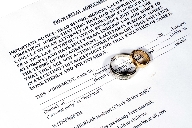If you don’t use a prenuptial agreement attorney, your prenup might not protect you the way you think it will. A court might rule it unenforceable. It could lack key legal requirements, or open you up to costly litigation during a divorce. An experienced attorney makes sure your agreement stands up to legal scrutiny and reflects your intentions.
This guide walks you through what can happen without legal help—and how the right attorney makes the whole process smoother, clearer, and far less risky.
Why Do You Need a Prenuptial Agreement Attorney?
A prenuptial agreement attorney ensures your prenup’s legal validity and enforceability in court. Without this professional guidance, your agreement might not have critical legal requirements.
This can lead to costly disputes or potential invalidation during divorce proceedings. You often need a lawyer for prenup finalization to avoid this. They guide both parties through disclosures, waive unnecessary risks, and draft terms that reflect your individual needs.
When you’re talking about love and commitment, it’s easy to push legal stuff to the side. But prenups aren’t about mistrust. They’re about protection and peace of mind. Understanding the benefits of a prenup lawyer helps ensure your agreement is more than just a handshake; it’s something the courts will actually honor.
They handle:
- Making sure both parties understand their rights and obligations
- Waiving or making the required disclosures
- Customizing terms for asset protection, spousal support, and estate planning
Prenuptial agreements involve complex legal issues, especially when assets, businesses, or future inheritances are on the line. Attorneys help ensure you’re protected during the marriage, but also if the relationship ends in divorce or death. Without that protection, even well-intended agreements may collapse under legal scrutiny.
A prenup attorney doesn’t just draft paperwork. They help make your agreement legally solid, balanced, and built to last if challenged.
What Can Go Wrong Without One?
Without a prenuptial agreement attorney, courts are more likely to declare yours invalid or unenforceable. Common DIY prenup risks include missing legal language, improper execution, or lack of financial disclosures. This opens the door to expensive court battles, spousal support claims, and property division issues you thought were settled. Legal mistakes in DIY prenups often go unnoticed until it’s too late. If that happens, legal costs may skyrocket.
It’s tempting to cut corners and think a free online template will do the trick. But real-life couples who tried that often find out that a single missing sentence or unclear clause can unravel the whole agreement. Here’s what can go wrong when legal support isn’t part of the plan.
Your Agreement Might Be Invalid
A prenup without legal oversight is at higher risk of being declared invalid, meaning a court could just throw it out entirely. Judges often check:
- Whether the agreement was signed voluntarily
- If both parties had access to financial disclosures
- Whether either side was coerced or pressured
- Whether the agreement is “unconscionable” (grossly unfair).
Even if both parties agree on the terms at the time of signing, lack of proper disclosures, absence of waivers, or ambiguous language can make the contract vulnerable. Courts must weigh whether both spouses understood and agreed to the terms, and poorly constructed prenups can make that difficult to prove.
You Could Face Massive Legal Fees Later
In the 2020 Delaware Supreme Court case Sherman vs. Ellis, Dean Sherman sued the attorney who drafted his prenup, which didn’t include statutory disclosure waiver language. This was more than just a legal technicality—it cost him over $300,000 in legal and expert fees to defend a poorly drafted prenup. All because of one missing sentence.
While couples might hesitate at the initial cost of a prenup attorney, defending bad prenups costs much more. Litigation around prenup validity often involves forensic accountants, expert witnesses, and hours of attorney preparation. These costs get out of control, especially if the other party claims being misled or pressured. Legal battles over prenups can last for years and drain the resources meant to be protected by the agreement.
You Might End Up with Unexpected Obligations
If your prenup is vague, misinterpreted, or contradicts state laws, you might have obligations related to:
- Spousal support
- Property division
- Retirement accounts
- Inherited or gifted wealth
Courts may choose to disregard or “blue-pencil” certain clauses, leading to unexpected divisions of wealth or support orders. This risk is especially high when one spouse has significantly more assets or if the agreement doesn’t address key life changes like children or illness. A strong prenup anticipates these variables with proper legal framing.
Without legal support, your prenup might not stand up in court—leaving you exposed to everything you thought you had protected yourself from.
How Can an Attorney Prevent These Problems?
A prenuptial agreement attorney prevents legal mistakes that could render your prenup invalid or leave you exposed in divorce. They ensure required disclosures are included or properly waived, customize the document to fit your financial circumstances, and protect both parties’ interests. Creating an enforceable prenuptial agreement and reducing the risk of court challenges necessitates their involvement.
You may only go through this process once, but an attorney has seen it all. They know the red flags, the fine print, and the situations that trigger court challenges. Their role isn’t just to draft a document—it’s to build something that can withstand legal scrutiny.
They Ensure Your Agreement Is Legally Sound
A good attorney will include language that proves:
- You each had access to financial disclosures or knowingly waived them
- You weren’t coerced or rushed into signing
- You understood what rights you were giving up
Prenuptial agreement laws vary by state, and even small mistakes—like missing a notary signature or filing too late—can invalidate the entire agreement. Attorneys avoid these pitfalls and keep your contract in line with enforceable standards. Their job is to draft language that holds up in court.
They Tailor the Agreement to Your Situation
Do you have children from a previous relationship? A large inheritance? Own a business? Attorneys know how to draft terms that account for:
- Separate vs. marital property
- Estate planning goals
- Second marriages or blended families
- Tax implications
Without tailored language, your agreement could leave certain assets unprotected or cause confusion about future obligations. An attorney will ask the right questions to cover all relevant factors. This personalized approach strengthens the agreement and reduces the chance of conflict later.
They Reduce the Risk of Disputes
Attorneys act as a neutral party, guiding couples through fair negotiations. They also insist on separate representation, ensuring each party receives independent legal advice. Courts see this as strong evidence that both spouses entered the agreement willingly and knowingly.
Separate representation limits claims of coercion, especially if one party is wealthier or more legally experienced. When both sides have independent advice, they’re more likely to understand and agree to the terms. This builds fairness into the process while giving the agreement more credibility in court.
An attorney doesn’t just write the prenup—they build it to withstand scrutiny, reduce tension, and reflect your real-life goals.
What If You Already Signed a DIY Prenup?
If you signed a DIY prenup without legal help, it might not hold up in court due to common DIY prenup risks. These agreements often lack essential clauses, proper disclosures, or required signatures, potentially making the prenup invalid. A prenuptial agreement attorney can review it, identify any legal flaws, and recommend whether to amend it or draft a postnuptial agreement instead.
If you’re reading this after the fact, you’re not alone. Many couples start with a DIY prenup thinking it’s “better than nothing,” only to later wonder if it’s even enforceable. Luckily, it’s not too late to fix things. Postnups and legal reviews can help safeguard your intentions moving forward.
Already signed something? Let an attorney take a look. Fixing issues now is easier (and cheaper) than dealing with disputes later.
How Courts Handle Disputed Prenups
Courts carefully test whether a prenuptial agreement was signed voluntarily, included proper financial disclosures, and met legal standards. If key elements are missing—like a disclosure waiver or evidence of legal counsel—the agreement may be challenged or even thrown out. Judges look at fairness, timing, and representation when assessing a prenup’s enforceability.
Prenups don’t always go unchallenged. In divorce, emotions run high—and a questionable prenup can become a battlefield. Here’s what judges look at when deciding whether your agreement holds water.
What if there’s no waiver of disclosure?
If a prenup doesn’t include a proper prenup disclosure waiver or show that one party knowingly waived the right to full financial disclosure, the agreement can be challenged as unconscionable, especially if one party didn’t understand the financial picture at the time of signing.
In states like Delaware, missing a disclosure waiver can open the door to costly legal battles. Courts take financial transparency seriously, and if a spouse claims they didn’t know what they were giving up, the court may agree. Including this waiver is a basic but critical safeguard that a lawyer won’t overlook.
What if someone claims they were pressured to sign?
Courts assess the voluntariness of the agreement. Did both parties have time to review it? Did they each have their own attorney, providing independent legal advice? Was the agreement signed days before the wedding?
If the agreement appears rushed or one-sided, courts may view it as coercive. The presence of independent legal advice and a proper timeline helps prove that both parties made informed choices. These are key details that a prenuptial agreement attorney manages.
Courts won’t enforce a prenup just because it exists. It has to meet legal standards—and that’s exactly what a good attorney helps you achieve.
Prenuptial Agreement FAQs
Can a prenup be invalidated if I didn’t have a lawyer?
Yes. If there’s no proof that you understood what you were signing or received advice (preferably independent legal advice), a court may void the agreement or declare the prenup invalid—especially if it’s one-sided or lacks disclosure. Legal review is often the difference between an enforceable agreement and a disputed one.
Can both spouses use the same lawyer?
That’s not recommended. Courts view separate legal counsel, providing independent legal advice to each party, as a sign that both parties entered the agreement freely and understood their rights. Shared counsel may raise red flags about fairness and impartiality.
I already signed a prenup without legal help. What now?
Speak with a prenuptial agreement attorney. They can review it and help you correct or update it through a postnup if needed. Acting early can preserve your intentions and prevent future disputes.
Can a prenuptial agreement protect my business?
Yes, a properly drafted prenup can shield your business from being divided or valued in a divorce. It can specify that the business remains separate property, outline how future growth is handled, and prevent disputes over ownership. An attorney will help you draft terms that align with state laws and your goals.
What happens if my spouse refuses to sign a prenup?
If your spouse refuses to sign, you can’t force them. But, open communication about financial expectations and fairness may help address their concerns. In some cases, a postnuptial agreement signed after marriage may be an alternative—but it still requires mutual consent and legal guidance.
Is It Worth Hiring a Prenuptial Agreement Attorney?
Absolutely. Without one, you risk signing a document that doesn’t hold up in court, fails to reflect your intentions, and costs you thousands in litigation down the road—far exceeding the typical cost of a prenup attorney. Whether you’re protecting personal assets, planning for children from a previous marriage, or seeking peace of mind, an attorney helps you create an enforceable prenuptial agreement right the first time.
Many couples think hiring a lawyer creates tension. In reality, understanding the benefits of a prenup lawyer shows it creates clarity. A solid, enforceable agreement drafted with professional input allows both parties to start their marriage with confidence, fairness, and protection.
A prenuptial agreement attorney is not a luxury—it’s a necessary protection for your future.
Resources:
Williamson, H. C., Hammett, J. F., Ross, J. M., Karney, B. R., & Bradbury, T. N. (2018). Premarital education and later relationship help-seeking. Journal of family psychology : JFP : journal of the Division of Family Psychology of the American Psychological Association (Division 43), 32(2), 276–281. https://doi.org/10.1037/fam0000383
Wand, Barbara Freedman (2012) “Ethical Issues in Representing Husbands and Wives in Estate Planning,” Marquette Elder’s Advisor: Vol. 2: Iss. 2, Article 13. Available at: https://scholarship.law.marquette.edu/elders/vol2/iss2/13
https://courts.delaware.gov/supreme/oralarguments/download.aspx?id=3594
https://www.vacourts.gov/static/opinions/opncavwp/1904114.pdf




